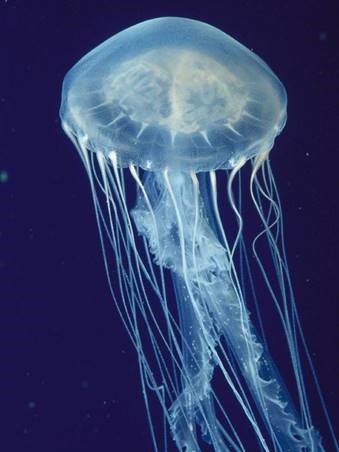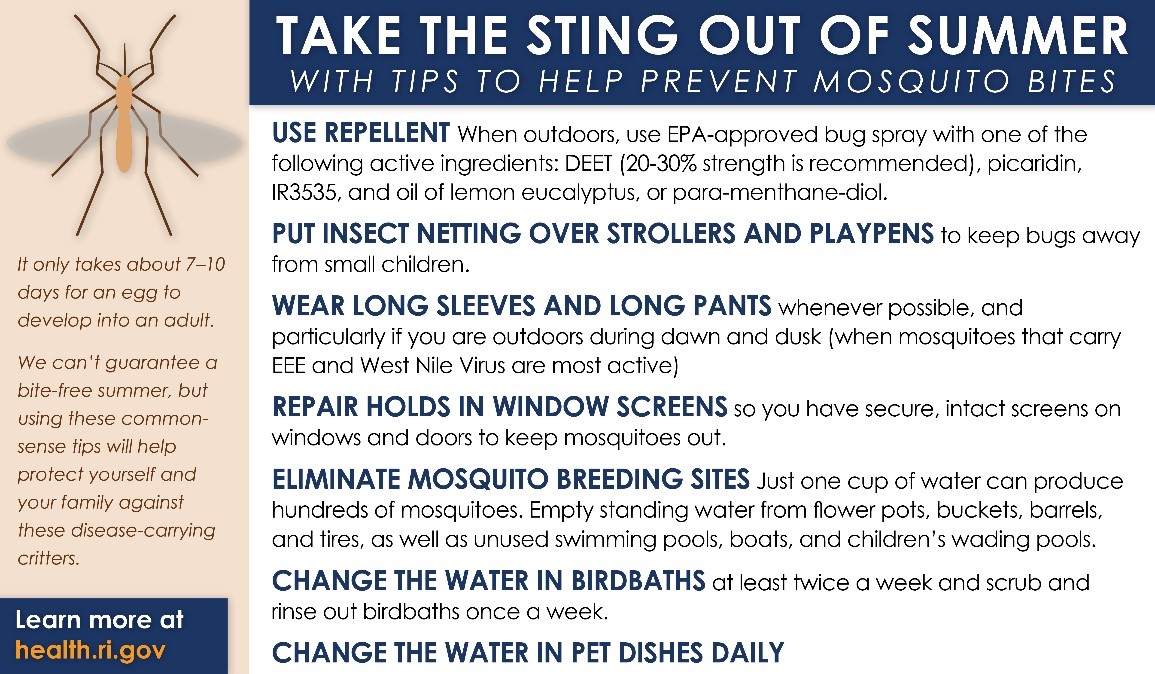“High numbers” of Atlantic Sea Nettle Jellyfish in Ninigret and Green Hills Ponds
By
Will Collette
The
good news first: DEM’s regular weekly report on mosquito-borne diseases show NO
sign of West Nile Virus. At least not yet. Even though Rhode Island has had no
discoveries of West Nile, there was one trapped bug in Milford, Connecticut and another in
Medford, Massachusetts that tested positive.Beware!
The full text of
DEM’s weekly report and their advice on protecting yourself is reprinted below.
The
jellyfish are a different story.
Katie Rodrigue, Principal Marine Biologist in DEM's
Division of Marine Fisheries, says there are THOUSANDS of jellyfish in Ninigret
Pond, seen in the western end along the East Beach side.
The
sting of an eastern sea nettle is not considered to be life-threatening but can
hurt like hell.
Here
is the DEM and Health Department news releases in full:
RIDOH and DEM Issue Advisory About Atlantic Sea Nettle Jellyfish
The Rhode Island Department of Health (RIDOH) and the Rhode Island
Department of Environmental Management (DEM) are advising the public that
Atlantic Sea Nettle Jellyfish have been identified in high numbers by DEM's
Division of Marine Fisheries in Ninigret and Green Hill Ponds. These ponds are
in Charlestown.
Sea nettles are often present during high summer in Rhode Island. They
are most common in the salt ponds in South County. People planning to recreate
in ponds in this area should bring a first aid kit and add a bottle of vinegar
and sting spray.
Images of Atlantic Sea Nettle Jellyfish are attached. Their stings typically
cause moderate discomfort and itchy welts.
If stung:
- Remove visible tentacles with a gloved hand or a plastic bag
- Rinse the affected area in vinegar or a commercially
available sting spray (or saltwater)
- Do NOT rinse with freshwater, as this can worsen the
sting
- Apply heat pack or rinse under hot water
- Use an ice pack and/or hydrocortisone cream to reduce
discomfort
- If symptoms worsen, seek medical attention
"There has been a high abundance of Atlantic sea nettle jellyfish in
Ninigret and Green Hill Ponds lately," said Katie Rodrigue, Principal
Marine Biologist in DEM's Division of Marine Fisheries.
"Their population in the ponds has been exploding over the last month or so, probably as water temperatures have increased, and last week we observed thousands of them in the western section of Ninigret Pond along the East Beach side. DEM joins RIDOH in urging the public to be vigilant while recreating in coastal ponds this summer and to carry a first-aid kit including vinegar in case of a jellyfish encounter."
While the reason for the increase in Atlantic Sea Nettle Jellyfish this
summer is not yet fully understood, their numbers are expected to decline over
the course over the summer. Other species of jellyfish are less of a concern,
like moon jellyfish (flat disc-shape with very short tentacles), and comb
jellyfish, which have no stingers at all.
Weekly Mosquito
Advisory
The
Rhode Island Department of Environmental Management (DEM) today announced that
all 92 mosquito samples from 28 traps set statewide on June 17 and June 21 have
tested negative by the Rhode Island Department of Health (RIDOH) for both West
Nile Virus (WNV) and Eastern Equine Encephalitis (EEE).
To date, in Rhode Island, there have been no findings of EEE or WNV in mosquito samples. The season's first two isolations of WNV in southern New England were reported last week from one trap set in Milford, Connecticut and one in Medford, Massachusetts.
These findings are not unexpected, as WNV has become established
in North America following its introduction in 1999. The positive findings in
neighboring Connecticut and Massachusetts indicate that WNV is beginning
seasonal activity in our area. WNV will become more prevalent as the season
progresses, so residents are advised to reduce their exposure to mosquitoes
until the first hard frost.
Personal
protection is the first line of defense against mosquitoes that may carry WNV,
EEE, or other diseases – and the most effective way to avoid infection. With
WNV and EEE established throughout the state, residents are reminded to
eliminate mosquito breeding grounds and prevent being bitten, whenever possible.
The following precautions are advised.
Protect
yourself:
- Put screens on
windows and doors. Fix screens that are loose or have holes.
- At sunrise and
sundown (when mosquitoes that carry EEE are most active), consider rescheduling
outdoor activities that occur during evening or early morning. If you must be
outside, wear long-sleeved shirts and long pants and use bug spray.
- Use
EPA-approved bug spray with one of the following active ingredients: DEET
(20-30% strength); picaridin, IR3535; and oil of lemon eucalyptus or
paramenthane. Always read the label and follow all directions and precautions.
- Do not use bug
spray with DEET on infants under two months of age. Children should be careful
not to rub their eyes after bug spray has been applied on their skin. Wash
children's hands with soap and water to remove any bug spray when they return
indoors.
- Put mosquito
netting over playpens and baby carriages.
Get rid of
mosquito breeding grounds:
- Get rid of
anything around your house and yard that collects water. Just one cup of water
can produce hundreds of mosquitoes; an unused tire containing water can produce
thousands of mosquitoes.
- Clean your
gutters and downspouts so that they can drain properly.
- Remove any
water from unused swimming pools, wading pools, boats, planters, trash and
recycling bins, tires, and anything else that collects water, and cover them.
- Remove or
treat any shallow water that can accumulate on top of a pool cover. Larvicide
treatments, such as Mosquito Dunks can be applied to kill immature mosquitoes.
This environmentally-friendly product is available at many hardware and garden
stores and on-line.
- Change the
water in birdbaths at least once a week and rinse out birdbaths once a week.
Best practices for horse owners:
Horses are
particularly susceptible to WNV and EEE. Horse owners are advised to vaccinate
their animals early in the season and practice the following:
- Remove or
cover areas where standing water can collect.
- Avoid putting
animals outside at dawn, dusk, or during the night when mosquitoes are most
active.
- Insect-proof
facilities where possible and use approved repellents frequently.
- Monitor
animals for symptoms of fever and/or neurological signs (such as stumbling,
moodiness, loss of appetite) and report all suspicious cases to a veterinarian
immediately. If you are unsure if your horse is properly vaccinated, you should
consult with your veterinarian.
Visit
health.ri.gov/mosquito for additional mosquito prevention tips, videos, and
local data. DEM and RIDOH also remind Rhode Islanders to take precautions to
avoid mosquito bites when traveling to Zika-affected countries. Pregnant women
and women who are considering becoming pregnant should not travel to countries
with active transmission of Zika.
Mosquitoes are trapped
weekly by DEM and tested at the RIDOH State Health Laboratories. DEM issues
advisories on test results from July through September, with additional reports
as necessary. Test results are pending for traps set between June 23 and July 1
are pending and will be included in future announcements. Typically, positive
test results trigger additional trapping to assess risk.
For more
information about DEM divisions and programs, visit www.dem.ri.gov. Follow us
on Facebook at www.facebook.com/RhodeIslandDEM or on Twitter (@RhodeIslandDEM)
for timely updates.
Related links

